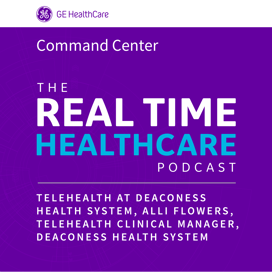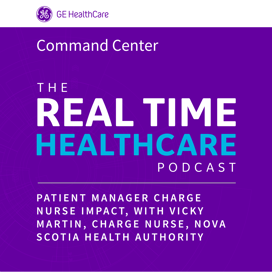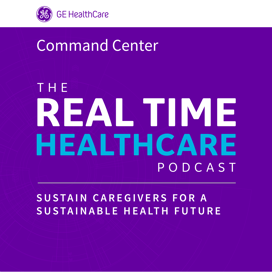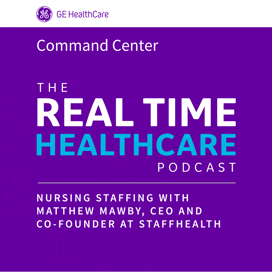In this Episode:
In this podcast episode, Jeff Terry is joined by Mudit Garg, the CEO of Qventus. They’ll be discussing the vision for Qventus and how real-time healthcare is so important for the day to day strategy around hospital operations.
Jeff Terry
- Hello and welcome. I'm Jeff Terry, delighted to be joined today by Mudit Garg, who's the CEO of Qventus. We're going to talk a bit about something that is important to both of us, which is real-time healthcare. Good morning, Mudit.
Mudit Garg
- Good morning, Jeff. Thanks for having me.
Jeff Terry
- Thank you. So, first question, please tell the audience about Qventus. What's your vision? How do you bring value to healthcare providers?
Mudit Garg
- At Qventus, we help hospitals and health systems manage their operations in real-time. And as you said, that as a result is important to both of us. But at the highest level, if you think about our vision, where my motivation came to be, is I strongly believe that world-class healthcare requires world-class operations. And what I mean by that is, when I first came into healthcare, I worked in process improvement, worked alongside doctors and nurses, I was at that time part of McKinsey & Company, in charged with helping a rural hospital, and it was amazing what I saw. I had a dichotomy on the one hand that even this rural hospital had world-class physicians, world-class treatments, equipment, therapies, and yet the experience of the average patient was far from world-class. That's just so surprising. How can those two things exist simultaneously? Anywhere in the world, if you want the rarest of rare disease treated, our healthcare system is the best place in the world to be at. Yet for the majority of the patients, we fall short. And that just was really surprising. And what struck me even more was that that was happening in spite of heroic efforts from staff, clinicians, managers, who would do whatever it took to take care of patients. If the patient's waiting for an MRI, "I'm the doctor, I'll wheel them in." Or "That patient didn't get the discharge instructions, that's okay, let me get on over and get it done." That kind of heroic, willingness to do whatever it took, "nothing's beneath me," in spite of that, we are seeing these issues. And sometimes there's a department leader or a manager with the time and energy to identify and look at a problem and say, "Oh, I need to adapt the process," and they would unlock the potential of the department in terms of quality, cost, and experience. There are hundreds of such things facing those folks requiring the superhuman effort to stay ahead of them, and the improvements gained in one area would often fade when their attention shifted to another. And of course, the staff that was doing these efforts was burning out. That's sort of my realization of saying, "Look, world-class healthcare is impossible without world-class operations." And that's what I set out to solve, how do we become a company that can be a strategic partner of health systems to build those world-class operations, to transform their operations? And being an engineer by background, I strongly believed in the power of data to do so, but the traditional way of just having data and dashboards, I knew it wasn't enough. Because the people who were busy didn't have the time and energy to look at them. So, we brought in the AI and machine learning to predict. We brought in behavioral science to change people's behavior. And operations management, to realize how to change the processes with a team with deep expertise in clinical operations, performance improvement and change management, to apply to these long-standing operations challenges. And that's what we are now doing at Qventus. So, I'm super proud that we've gotten a chance to work with leading organizations across the country, all the way from community hospitals, academic medical centers, safety net hospitals like CommonSpirit, HonorHealth, M Health Fairview, Mercy, New York Presbyterian, Boston Medical Center, to name a few. And that's why I'm so passionate about this topic, and we share this passion on real-time health care.
Jeff Terry
- Amen. And I just echo, I agree with all that. And the caregivers are amazing. The environment is complex, so how do we help them, work with them, to make it easier for them to do what they're already trying to do? And so real-time healthcare, obviously, is a part of the solution for that. So what does real-time healthcare mean for you?
Mudit Garg
- That's a good question. If you think about healthcare, healthcare is an area with high inherent variability, different patients, different conditions, different progression even of the same condition, different types of care; and that, of course, that high inherent variability makes the job of managing the system, as you were just saying, around the delivery of care, much more complex because underlying it is a series of rapidly changing and highly variable paths. So that makes it complex, and that makes it difficult to manage oftentimes. But anytime you think of an environment that is highly variable and rapidly changing, what's the best system for that? I've always found the best system for that is something that can rapidly adapt to the presenting situation. Not in days, not in weeks, not in decades, but as it happens. And that's what real-time health care is to me. What would allow us to adapt to the patients, the populations, the progression of their care, on the fly as information becomes available to provide the patients with the best possible care with the resources we have? And that adaptation needs to happen at multiple levels. Like at the patient level, as I said, if this patient was an NPO and needed a whole bunch of IV medications, but is now changing, how do we adapt to that? If they're now much healthier to leave the hospital sooner, how do we adapt to making sure their post-acute is set up? For ancillaries, it means adjusting the priority. For ORs, it means identifying and releasing blocks and capacity, where the patient will go. In the ED, predicting ahead of time. At a system level, and in COVID, more than most times demonstrated this, realizing where my capacity is going to be, where my bottlenecks are going to be, how do we release that? And all of this needs to happen fast but also automatically. It shouldn't require that heroic effort. It shouldn't require a patient pestering someone to say, "Hey, my condition's changed. What's my plan supposed to be?" Or a case manager, or an executive who noticed something is out of whack and then raise a red flag and then try to manually intervene. That's what we rely on today. But I think real-time healthcare would change that, in my mind. A great analogy is kind of like a great basketball team. Of course, they have a process. They have certain offenses they've practiced, and they practice a lot of different plays, and they come into a game with a game plan, but you don't just sort of wait quarter after quarter to say, "Hmm, what should I do in this situation?" You're adapting in the moment, as it's happening, as the opposition's changing, and that's what a great basketball team does. And that's what we need. Formally, I think Gartner defines the four attributes of the system as like, first we need to be aware of what's happening. We need to be collaborative. So since healthcare is a high stakeholder environment, we need to be smart in learning about it. And we need to make sure that we are also able to orchestrate things in real-time. All that is good, but if you can't do something with it in real-time, that's not helpful. I think all of those are very important attributes of that real-time healthcare and that allow it to adapt in real-time.
Jeff Terry
- Amen. And I want to double click on a part of that, which is the phrase real-time. And there's sort of an information component threaded into what you're describing. And I find that's a concept that sometimes people who aren't close to this sort of underestimate how different real-time information is. I've had people say, "Well, I get a dashboard sent to me once a day, so I have what I need, real-time information." "No, no, no. That dashboard is real-time once a day. We mean in the moment." I love your basketball, "Here I am, what decision do I make in the moment with information that's current?" So, what is real-time? Double click on that piece of it, please?
Mudit Garg
- I think I was sharing with you... You're spot on. Like, what is the definition of real-time? And very often once a day is passed off as real-time. I think for an environment that is as inherently variable as healthcare is, that's just not acceptable. And I think in the time of COVID, it exposed the gaps and the burden we have placed on our care teams with an operational system that's not real-time. Where is your now... In the pandemic, if you're not able to understand right now, where you have capacity right now, where you can create capacity right now; which of my negative airflow isolation rooms can get freed up? It is completely pointless to know that at 6:00 AM I had four of them. That doesn't help me at all. And I think that's the bottom line. That is why this real-time is so important because this current state already is not working. The pandemic has exposed it to people beyond, in the thick of it, how difficult it is. And our answer in the pandemic for many health systems was to have multiple times a day, huddles, and that solved some of it. But candidly, our current state just isn't working. We are far, far from real-time. We have these rigid operations versus real-time operations. We bought the technology. The process and the people infrastructure, it doesn't support the kind of adaptability we were talking about. Instead, we rely on the superhuman heroic efforts to support that adaptability for someone to realize improvements are sporadic and cheerleading driven. And I think as a result of it, there's a ton of waste across the board. For example, we focus on one aspect of the patient journey, where we want to make sure patients don't have to spend excess time in the hospital. That's not good for the patient, not good for the healthcare system economically, not good from a hospital acquired condition standpoint. I think Advisory Board estimation was that about 22% of hospital days are excess. And that's about $10 billion of annual waste across the industry in that problem alone. And that's at a time when we have significant financial pressures. There is large quantities of the patient population that is not insured, that is not able to access healthcare. Imagine what that waste would allow us to be able to serve more patients with the same cost base. Even if we wanted to spend more money, candidly, we don't have the nurses and doctors to take care of more patients. And by being able to eliminate that waste, we can take care of so many more patients. And of course, I think the thing that everyone hates is having to chase those operational bottlenecks at the last minute. And at a time when these doctors and nurses are so burnt out; I think allowing solving for that. I think that's why for me, the real-time is important. And we've backed that with actually looking at data. So in the same journey of the patient piece, we studied about 75,000 patient encounters. And we said, "Okay, what helps make sure that the excess time a patient's having to spend is getting addressed?" And it's very clear. The earlier you have a plan of a patient... If you have a plan of the patient, where they're going, when they're going, and it's accurate by the second midnight, there is 91% fewer excess days. If you are able to orchestrate and solve the barriers, we see again, 45% reduction in excess days. Both of those require us to be adapting very rapidly to the changing situation of the patient and have something way more upstream than healthcare today allows. So this sort of why my belief is both at a macro level that real-time healthcare is critical, but almost... Well, we've seen a process that needs to change a way of providing care. That the logistics of providing care needs to change. We see the data bear out, that the way of managing in real-time is significantly better for patients and better for the health systems than the way of managing that we subject our patients and our staff to today.
Jeff Terry
- Amen. Speed to diagnosis, speed to treatments, speed to rescue, speed to get home. fewer resources, less cognitive load. Amen. It all adds up. And I love what you said, by the way, that it's so right that... And frankly, that 6:00 AM report, if it's 9:00 AM, may actually be a negative because you either have a false sense of confidence, or you have a missed opportunity because you don't know that something is opened up. And so the difference between current information and slightly aged information in the dynamic environment of patient care, it's night and day.
Mudit Garg
- If I can add one more, actually, example, to where I first learned the importance of exactly what you're describing, probably at this time, like 8, 9, 10 years ago, when we were first applying ML, we were applying it in a maternity ward. So, I was predicting the census. And we would sort of predict the hourly census, so we could adapt how staffing would be. And of course, it was based off of clarity reports because that's all we could access at that time. This was when there was just two people in the company. And we got that data, which was as of midnight. We got that data at 7:00 AM and at 7:02, we would send our predictions out. And I would go every day, talk to the nurse manager, how she thought and what she thought the predictions were. And you know, one of the days she said like, "Look, your prediction was wrong at 7:00 AM itself. Like what you said it should be a 7:00 AM was already wrong." And I was like, "Ah, it's based on the data from midnight. So, we are already predicting, by the time we get it to you." She's like, "It doesn't compute. It doesn't matter why. It doesn't compute." And I think that was just a real understanding, a realization of, if you cannot understand the context that a care team and a patient is facing right now, how can you help them make the best decisions? You can't. You just cannot. You either have that false sense of confidence, or you end up actually underestimating the problem. Neither one is good. And you lose the trust of the patients. You lose the trust on the care team in the process.
Jeff Terry
- Amen. And plus, there's so many aspects. The discharge planning you mentioned, same thing, if the information is not current, we can't plan accurately and all the benefits of doing so that you mentioned are lost. Obviously, there's tons of software in healthcare in use today. And companies like Qventus, GE, in some similar ways. Other companies provide software related to these real-time concepts. So there already is software. The kind of software that you make, why is it essential? How's it different from what's already out there?
Mudit Garg
- It's a really good question. I think, look, there are some essential portions of software that if hadn't been there, we wouldn't be able to do anything in real-time. So, I think it's important that we have those. We have made tremendous progress in having systems of record in place that gave us the ability to digitally understand what the context is right now. And I think they play a critical role in providing that system of record, providing that understanding. It's unfortunate that it kind of, today, it has to be on the backs largely of humans entering that data, but I think we are as an industry moving more and more towards that, getting more digitized and getting more automated as well. But that's not enough. We have seen again and again that probably the classic approaches... I have a system of record, and I have a performance improvement project that just hasn't been enough for delivering sustained operational improvements. Because what those rely on is that a human has to take that sort of information, which is coming at such pace, take vast quantities of that information, be able to make a decision, chase the orchestration of what needs to happen, and then keep that kind of heroic effort going over long periods of time. If you look at the patient, at the inpatient length of stay data over the last 20 years, in spite of the system of record gains, it's essentially been flat. And that sort of bears out that we, of course, need that system of record, but we need something different. We need to go beyond that. We need to make organizational reliability happen without heroic efforts. And that's sort of what I believe, the core of reliability is that automation platform. And for us, what that means is we have to be able to identify the issues before they happen without requiring a human to scour through a report, through hundreds and hundreds of data points. So we use our probabilistic inference models to identify those issues way before they're happening, not just identify the issue, identify the probability of all the different things happening because we can trigger decision points based on that. So that's the first thing. We learned very early that making predictions is good, but nearly not enough because you have to then help them orchestrate the action. You have to help them understand what to do, how to do it. You have to automate steps so that... You have to make the right thing to do the easy thing to do, so that at that point in time, it just happens. And that requires user centered design principles. That requires hardwiring habits. That requires designing new processes that wouldn't have existed. And then lastly, again, as I said, the environment is so variable and always changing, and people are coming in and out. You need to close the loop and understand what is working, what's not working, where do we need to improve, where are our processes failing? Much like you would do preventative maintenance in a factory, you need to do that preventative maintenance on our processes as well. And I think those three things are core to forming organization habits. Actually, at a human level, if you look at all the behavior science theory, it is very similar. You need to have a cue, you need to have a routine, and you need to have a reward. So that's very similar to at an organization level, you need to have identification of an issue proactively, you need to orchestrate across a large group of people and need to manage the accountability somehow. And that's sort of the platform that's core to our system of action. That's how we go from a system of record to a system of action. And it's a set of underlying technologies, but it's also a set of very packaged solutions of what process, what management practices, that need to go around. And that's what we find is required for our health system partners to achieve the results we've seen, but also sustain the results we've seen. And the underlying technical platform's pretty critical for that to allow to launch new solutions, but also, the solutions of saying, "Here's exactly what to do and how to do it," is super critical. And every time we do that, we see length of stay reduced by 0.3 to 0.8 days, driving a 50 to 90 basis point improvement in cash flow margin, and 10 million plus dollar value per the facility. But also, most importantly, helping these health systems achieve systemness. Many of these health systems processes are unit by unit varied, facility by facility varied. And most of the operations is managed by touch and feel. And you can do touch and feel on a unit-by-unit basis when you need to achieve systemness. When you need to go centralize or actually go virtualize, that doesn't work. And being able to do that while reducing the cognitive burden on the frontline teams, allowing them to practice at the top of their license, I think that demonstrates to me that the systems of record play a critical role, but there are a set of capabilities that need to be brought, both technically and process-wise, that need to operationalize this change into a very reliable management of the highly variable clinical care that we deliver.
Jeff Terry
- I love what you said, by the way, to make the right thing the easy thing, which is essential. People want to do the right thing, but it has to be easy. And boy, I just, I couldn't agree more. The system's record are essential and important. but they're insufficient. They don't provide that, to use your word, that orchestration layer that gets you to standardization and systemness and all the things that we've talked about. Mudit, brilliant. I'm inspired. You and I are sort of on the same wavelength, so it's just really cool to talk to someone that is sort of living in the same space, fighting the same battle. So, thank you so much.
Mudit Garg
- Absolutely. No, thank you, Jeff. It is a pleasure, and I loved talking to you on these same topics because we are the same wavelength, and I love sort of pushing our own thinking as well with that.
Jeff Terry
- Here, here. Thank you again. And with that, I'll close the podcast.







